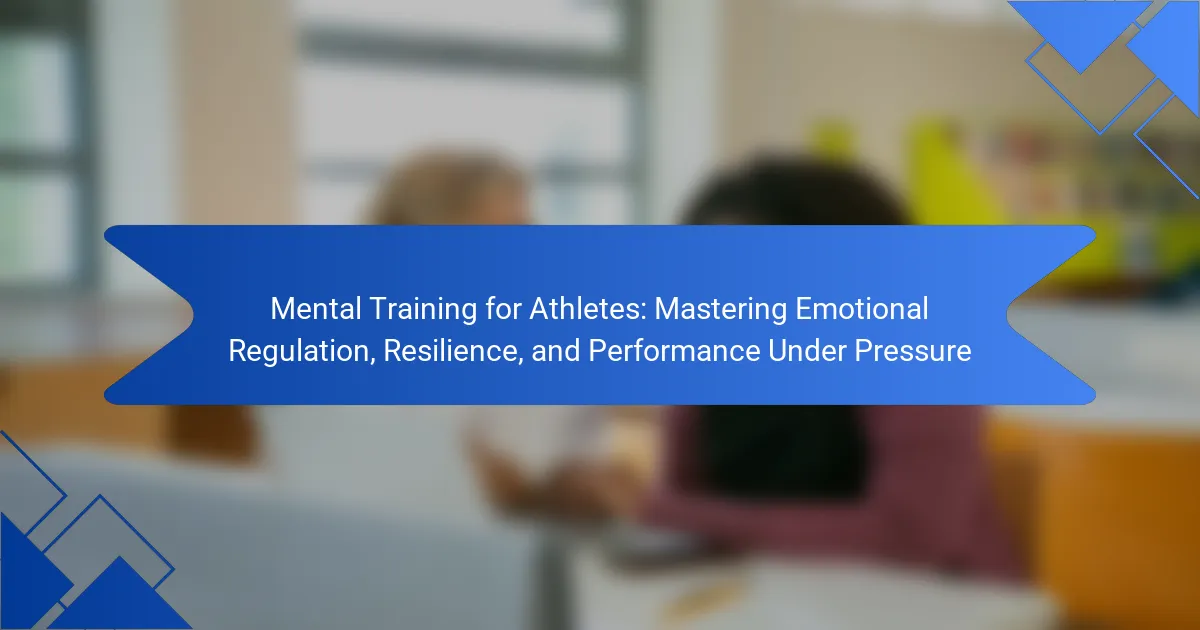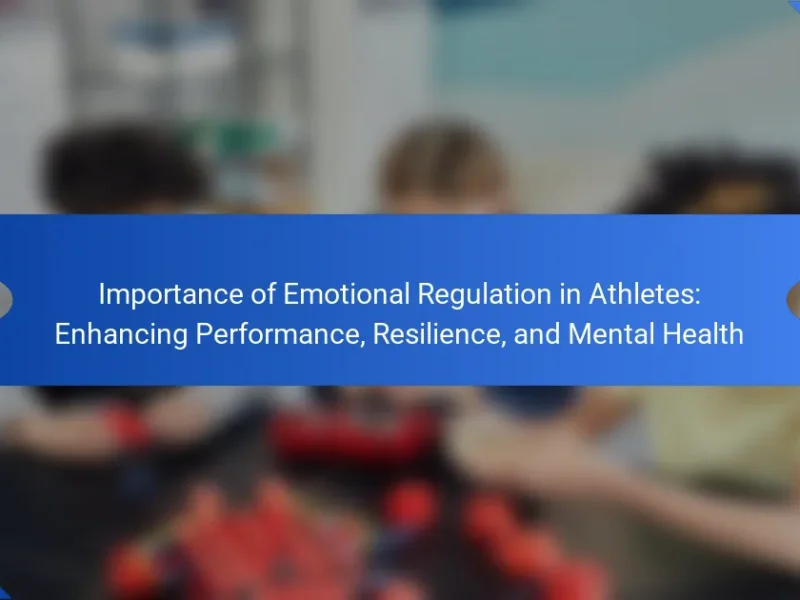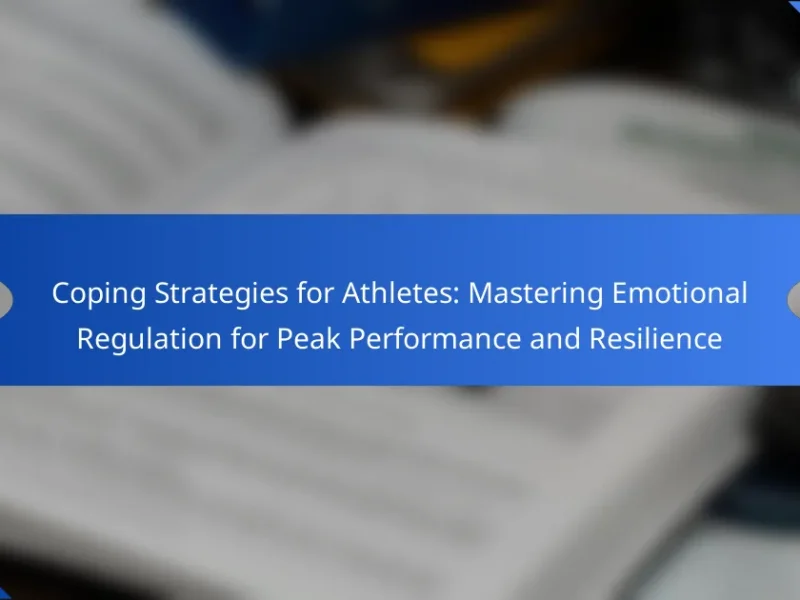Athletes face immense pressure to perform, making emotional regulation crucial for success. This article explores how mastering emotional regulation enhances resilience, improves focus, and boosts performance metrics. It delves into effective techniques like mindfulness, visualization, and self-talk that elite athletes use to manage stress. Additionally, it highlights emerging practices such as biofeedback that are gaining traction in the sports community.
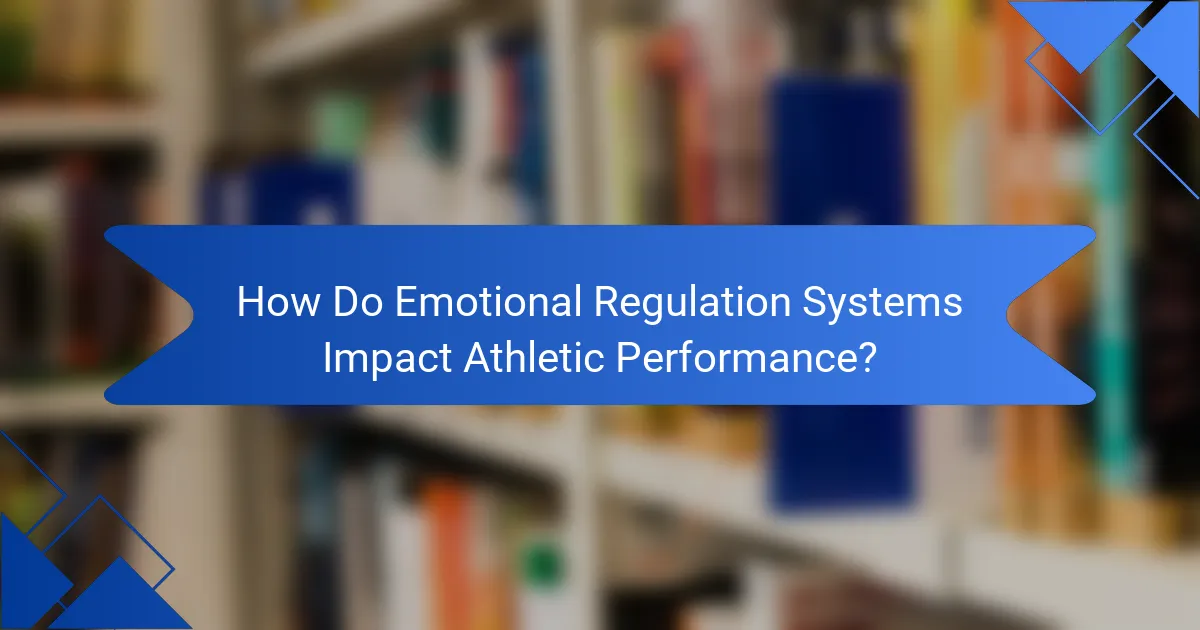
How Do Emotional Regulation Systems Impact Athletic Performance?
Emotional regulation systems significantly enhance athletic performance by enabling athletes to manage stress and maintain focus. Effective emotional regulation leads to improved resilience, allowing athletes to perform under pressure. Studies show that athletes with strong emotional control experience less anxiety and greater concentration, resulting in better outcomes in competitions. Additionally, mastering emotional regulation can lead to unique advantages, such as increased motivation and sustained effort during challenging moments.
What Are the Key Components of Emotional Regulation in Sports?
Emotional regulation in sports involves managing emotions to enhance performance. Key components include awareness of emotions, cognitive appraisal, coping strategies, and mindfulness practices. Awareness helps athletes identify emotional triggers. Cognitive appraisal influences how athletes interpret stressors. Coping strategies, such as positive self-talk, promote resilience. Mindfulness practices enhance focus and emotional stability, leading to improved performance under pressure.
Why Is Emotional Regulation Essential for Resilience in Athletes?
Emotional regulation is crucial for resilience in athletes because it enables them to manage stress and maintain focus during high-pressure situations. This skill helps athletes recover from setbacks and enhances their overall performance. Research indicates that athletes with strong emotional regulation can better cope with competitive stressors, leading to improved mental health and consistent results. Developing this attribute through mental training can significantly boost resilience, allowing athletes to thrive in challenging environments.
What Techniques Enhance Emotional Awareness?
Mindfulness, journaling, and visualization techniques enhance emotional awareness for athletes. Mindfulness practices promote present-moment focus, reducing anxiety and improving emotional clarity. Journaling allows athletes to reflect on experiences, fostering self-awareness and emotional processing. Visualization techniques help athletes mentally rehearse scenarios, enhancing emotional regulation under pressure. These strategies collectively build resilience and enhance overall performance.
How Can Athletes Develop Emotional Control?
Athletes can develop emotional control through techniques like mindfulness, visualization, and cognitive restructuring. These methods enhance self-awareness and resilience, enabling better performance under pressure. Regular practice leads to improved emotional regulation, helping athletes manage stress and maintain focus during competitions.
What Role Does Emotional Regulation Play in High-Pressure Situations?
Emotional regulation is crucial in high-pressure situations as it enhances athletes’ performance. Effective emotional control allows athletes to maintain focus, manage stress, and make better decisions during competitions. Studies show that athletes who practice emotional regulation techniques, such as mindfulness and cognitive restructuring, demonstrate increased resilience and improved performance metrics. By mastering these skills, athletes can transform anxiety into motivation, ultimately leading to superior outcomes in their sport.
How Do Athletes Manage Anxiety During Competitions?
Athletes manage anxiety during competitions through mental training techniques that enhance emotional regulation and resilience. These strategies include visualization, mindfulness, and controlled breathing, which help athletes maintain focus and composure under pressure. For example, visualization allows athletes to mentally rehearse their performance, reducing anxiety and boosting confidence. Research indicates that regular mindfulness practice can significantly lower anxiety levels and improve overall performance. As a result, athletes who incorporate these mental training methods often experience enhanced resilience, enabling them to perform optimally even in high-stress situations.
What Strategies Help in Overcoming Performance Anxiety?
Mental training strategies that help overcome performance anxiety include visualization, breathing techniques, and positive self-talk. These methods enhance emotional regulation and resilience, enabling athletes to perform under pressure.
Visualization involves mentally rehearsing successful performances, which can increase confidence. Breathing techniques help calm the nervous system, reducing anxiety symptoms. Positive self-talk replaces negative thoughts with affirmations, fostering a supportive internal dialogue.
Incorporating these strategies into regular training can significantly improve an athlete’s ability to manage anxiety during competitions.
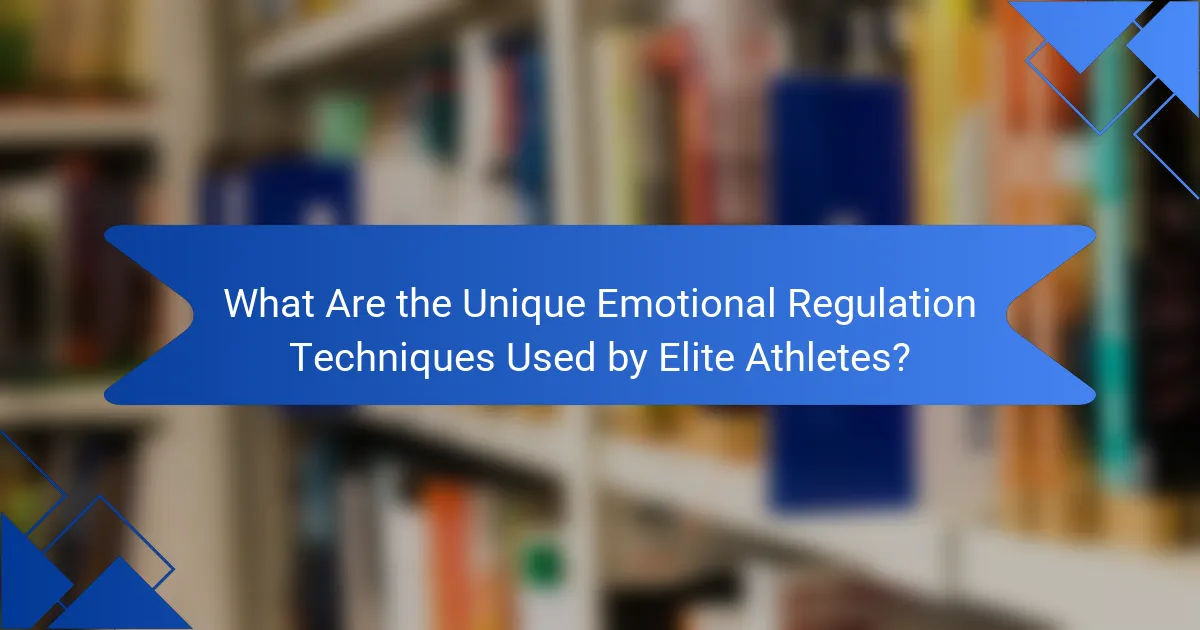
What Are the Unique Emotional Regulation Techniques Used by Elite Athletes?
Elite athletes use unique emotional regulation techniques such as mindfulness, visualization, and self-talk to enhance performance under pressure. These methods help manage stress, maintain focus, and foster resilience.
Mindfulness involves being present and aware, allowing athletes to control their emotional responses. Visualization enables them to mentally rehearse scenarios, boosting confidence and reducing anxiety. Effective self-talk reinforces positive beliefs and motivates athletes during challenging moments.
Research shows that these techniques can significantly improve performance metrics, such as reaction time and decision-making accuracy. By mastering emotional regulation, elite athletes gain a competitive edge in high-stakes situations.
How Do Visualization and Mental Imagery Aid Emotional Regulation?
Visualization and mental imagery significantly enhance emotional regulation by allowing athletes to mentally rehearse scenarios. This practice helps them manage anxiety and maintain focus during high-pressure situations. Athletes who engage in visualization report increased resilience and improved performance metrics. Research indicates that these techniques can lower stress levels, leading to more effective emotional responses.
What Role Does Self-Talk Play in Enhancing Emotional Resilience?
Self-talk significantly enhances emotional resilience by promoting positive thinking and stress management. Athletes who engage in constructive self-talk can better regulate their emotions under pressure. This mental training technique fosters a growth mindset, allowing athletes to view challenges as opportunities. Research shows that positive self-talk can lead to improved performance and reduced anxiety, ultimately contributing to overall emotional resilience.
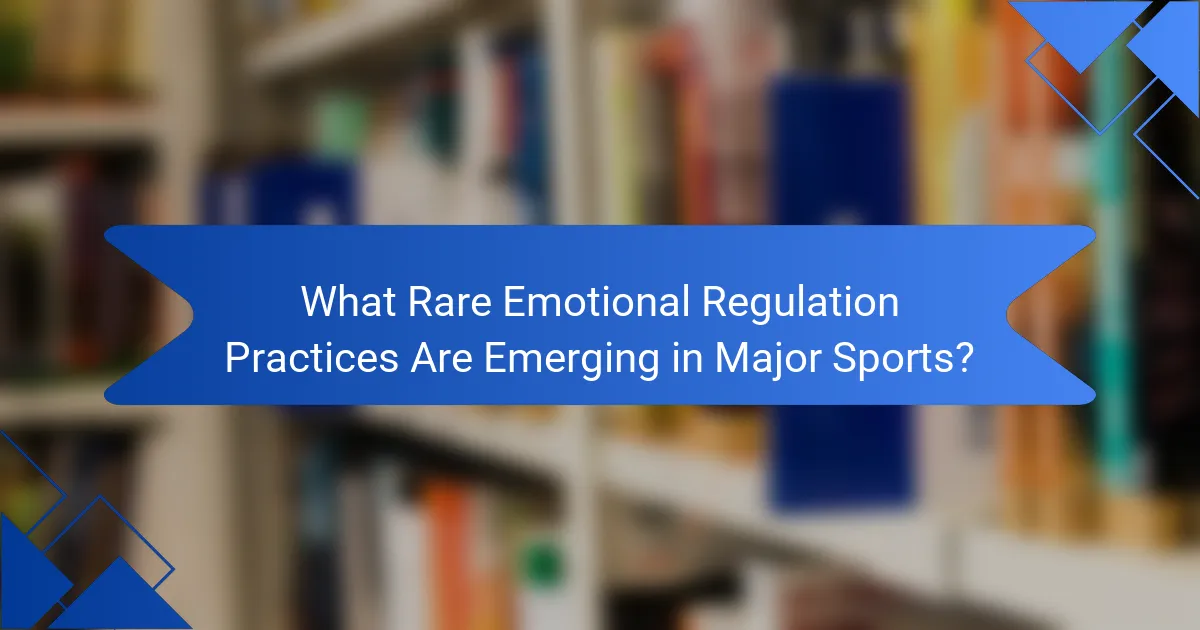
What Rare Emotional Regulation Practices Are Emerging in Major Sports?
Emerging rare emotional regulation practices in major sports include mindfulness training, visualization techniques, and biofeedback. These methods enhance athletes’ ability to manage stress and maintain focus during competition.
Mindfulness training helps athletes stay present, reducing anxiety and improving performance. Visualization techniques allow athletes to mentally rehearse success, boosting confidence. Biofeedback provides real-time data on physiological responses, enabling athletes to adjust their emotional states effectively.
These practices are gaining traction as teams recognize the importance of mental resilience in achieving peak performance. By integrating these unique approaches, athletes can cultivate a stronger mental game, enhancing their overall competitive edge.
How Are Biofeedback and Neurofeedback Being Utilized by Athletes?
Biofeedback and neurofeedback enhance athletes’ mental training by improving emotional regulation and resilience. These techniques help athletes monitor physiological responses, allowing them to maintain focus and composure under pressure. For instance, biofeedback provides real-time data on heart rate and muscle tension, promoting relaxation and concentration. Neurofeedback trains brain activity, enabling athletes to optimize cognitive functions like attention and anxiety management. As a result, athletes can achieve peak performance during high-stress situations.
What Innovative Approaches Are Coaches Implementing to Foster Emotional Regulation?
Coaches are utilizing innovative techniques such as mindfulness training, cognitive restructuring, and biofeedback to enhance emotional regulation in athletes. These approaches help athletes manage stress and maintain focus during competition. Mindfulness training encourages present-moment awareness, which improves emotional responses. Cognitive restructuring aids in reframing negative thoughts, fostering resilience. Biofeedback allows athletes to gain insight into physiological responses, promoting self-regulation. Collectively, these methods support improved performance under pressure.

What Are the Core Benefits of Mastering Emotional Regulation for Athletes?
Mastering emotional regulation offers athletes numerous core benefits that enhance performance. Improved focus allows athletes to concentrate better during competitions. Enhanced resilience helps them recover quickly from setbacks. Increased confidence boosts their belief in abilities, leading to superior performance under pressure. Better stress management reduces anxiety, enabling clearer decision-making. Lastly, emotional awareness fosters strong team dynamics and communication, essential for collaborative sports environments.
How Does Improved Emotional Regulation Lead to Enhanced Performance?
Improved emotional regulation enhances performance by enabling athletes to manage stress and maintain focus. This skill allows for better decision-making under pressure, leading to optimal execution of skills. Research indicates that athletes with strong emotional regulation show increased resilience, which directly correlates with improved performance metrics. By mastering emotional regulation, athletes can sustain motivation and recover quickly from setbacks, ultimately enhancing their competitive edge.
What Common Mistakes Should Athletes Avoid in Emotional Training?
Athletes should avoid common mistakes in emotional training to enhance performance. Key errors include neglecting self-awareness, failing to develop coping strategies, overemphasizing positive thinking, and not seeking support.
Neglecting self-awareness can lead to unrecognized emotional triggers, hindering performance. Developing coping strategies is essential; without them, athletes may struggle during high-pressure situations. Overemphasizing positive thinking can create unrealistic expectations, leading to disappointment. Lastly, not seeking support from coaches or peers can limit emotional growth and resilience.
What Best Practices Can Athletes Implement for Effective Emotional Regulation?
Athletes can enhance emotional regulation by practicing mindfulness, developing coping strategies, and maintaining a consistent routine. Mindfulness techniques, such as meditation and deep breathing, help athletes stay present and manage stress during competition. Coping strategies, including visualization and positive self-talk, promote resilience and confidence. Establishing a consistent training routine fosters stability, allowing athletes to better handle emotional fluctuations.
